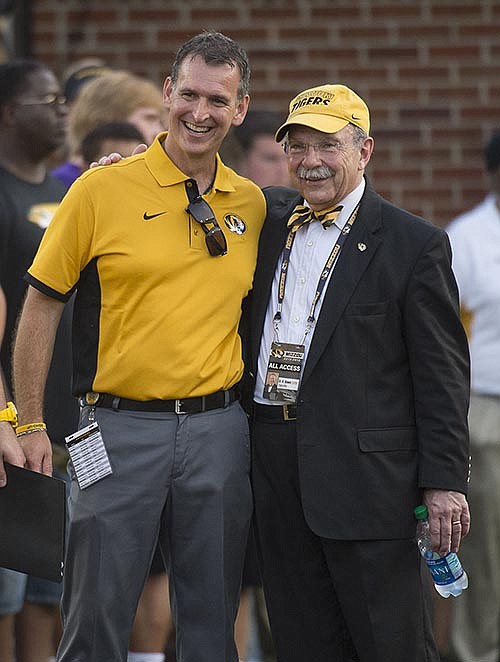Mack Rhoades' one-year anniversary in late April as Missouri's athletics director did not come with celebration.
In fact, it probably would have just been another day if you did not know when Rhoades was hired from Houston to replace the retired Mike Alden.
There was no press conference. No press releases were issued. No dinner served to alumni or donors to commemorate his achievements; instead it was pretzels and bottles of water served to a roundtable of about a dozen media members from across Missouri.
This was the only time Rhoades was made available to discuss his tenure at Missouri, and only one member per media outlet was permitted to attend. The discussion was not to be promoted publicly, and live tweeting during it was prohibited.
The public was not to be made aware until after Rhoades concluded discussing his tenure, which at the time was highlighted by the football team's boycott in November and the NCAA announcing the men's basketball team committed violations under former coach Frank Haith. A Title IX investigation against softball coach Ehren Earleywine has since been launched. And none of that includes on the field struggles from some of the program's most prominent teams.
Rhoades' mannerisms reflected that of a man wondering what he got himself into. He avoided eye contact as much as seemingly possible. He did not touch on the controversial moments in his seven-minute opening statement. He did not break a smile even when addressing the positives of his time as Missouri. It appeared to be only a matter of time before Rhoades would depart.
That departure came just shy of three months later when he accepted the same position at Baylor.
Yes, that Baylor that fired Art Briles, the man who got them out of an endless cycle of losing and on the doorstep of a possible national championship run. That Baylor, like Missouri, with an interim president. That Baylor, discovered to have turned a blind eye to sexual assaults committed by several former players and as a result will lose two years of recruiting and years of possible lawsuits and donor losses. That Baylor, which makes Missouri's issues seem non-existent by comparison.
Yet Baylor offers him a fresh start. Rhoades had nothing to do with the mess the program is in. The college football world is one of quick memories and sweeping troubles under the rug. If he lures his former football coach at Houston, Tom Herman, to Waco and Herman gets the Bears back to prominence on the field, Rhoades will be lauded as a savior.
But in Columbia? He might as well be Missouri's Genghis Khan - a man who walked into a stable situation and left after it became a fiery ruin.
It is hard to blame him for much of what happened. The seeds of the boycott were planted long before he was hired. The men's basketball violations occurred under Alden. Earleywine's investigation would have happened regardless of who was in charge.
He inherited a mess in the making. He leaves his successor an even bigger one.
Rhoades completed only 14 months on the job. The events that occurred in the time might have felt like it was a lifetime.
Especially the football team's boycott.
On Nov. 7, a group of black football players said they would not participate in team activities in support of graduate student Jonathan Butler, who refused to eat until then-University of Missouri systems president Tim Wolfe resigned. Coach Gary Pinkel shared a photo of a group of players - larger than the one who originally went public with their boycott and included black and white players - standing in solidarity with Butler the following day.
Whether or not the boycott was a positive or negative event has been fiercely debated. What cannot be debated, however, was the media circus it caused.
Campus was flooded with parachute journalists from ESPN to CNN flocked around Mel Carnahan Quadrangle on Nov. 9, where protest group Concerned Student 1950 had camped. Butler began his hunger strike Nov. 2, yet it was the football team's boycott that turned a local story into a national headliner. Wolfe resigned later that day; the team resumed activities shortly after.
Rhoades said he was not sure how long off the top of his head he has been in the athletics business. It could be 17, 18 or 20 years as far as he is concerned. Regardless, he has still seen his share of curveballs, which is why he said he was not surprised by the football team's boycott in November.
Maybe he was not surprised. But he certainly was not ready for it. He even admitted so in April when he questioned if he handled the events leading to it properly.
"I think, maybe if anything, as I think back, did I, candidly, need to have a better understanding of what was going on on campus, and how some of those things were handled and how they filtered down to specifically our football program," he said.
That was just the beginning.
In January, the NCAA announced the men's basketball team committed multiple NCAA violations under former coach Frank Haith from 2011-13.
With hope the NCAA would not give harsh sanctions to the team, current coach Kim Anderson and Rhoades decided to punish themselves. They voluntarily did not participate in a post-season tournament last season and stripped the team one scholarship for the upcoming season and one for the 2017-18 season.
Anderson said in June the investigation was supposed to have concluded by early May at the absolute latest. Rhoades left it as a cold case. Just like he did with Missouri's Title IX investigation involving Earleywine.
The Title IX Office became involved to review allegations of sex discrimination, sexual harassment or sexual misconduct after the athletic department received complaints inside and outside the softball program about Earleywine. Rhoades said July 1 the investigation was out of his hands.
Two investigations. Two fallouts someone else will have the buck passed to.
He also will not be part of any on the field turnarounds, either.
Under his watch, the football team took a nosedive from back-to-back Southeastern Conference Eastern Division champions in 2013-14 to tied for the worst SEC record in 2015. A third straight trip to Atlanta for the SEC title game would have been a difficult task, but they did not even get a trip to a bowl game.
Missouri also found itself in the basement of the SEC in men's basketball. Those Tigers finished 10-21 overall and 3-15 in the SEC during Anderson's second season. He is 19-44 overall and 6-30 in conference games in his two seasons at Missouri.
Anderson was not hired by Rhoades, but his former boss continuously supported him through the program's rebuild. Not only did Anderson inherit a team stricken with NCAA violations, he also saw eight players transfer or be dismissed last season.
"Kim didn't have to take the job; he decided to take the job," Rhoades said. "But the reality is he inherited a really, really tough situation."
Rhoades also conceded Missouri's move from the Big 12 to the SEC created a tough situation for its baseball team due to the location causing harsher weather than conference counterparts when the season starts in February. Still, the Tigers were ranked No. 15 to start the 2016 season. They finished the season with a losing record.
Despite all of the troubles, both on and off the field, Rhoades in April called Missouri a special place. Now, just shy of three months later, he leaves that special place with nothing more than a prepared statement as a parting gift.
"I believe the athletic department has a very bright future," Rhoades said in the statement.
If the last 14 months are any indication, that bright future might take longer than Rhoades' tenure at Missouri to achieve.


